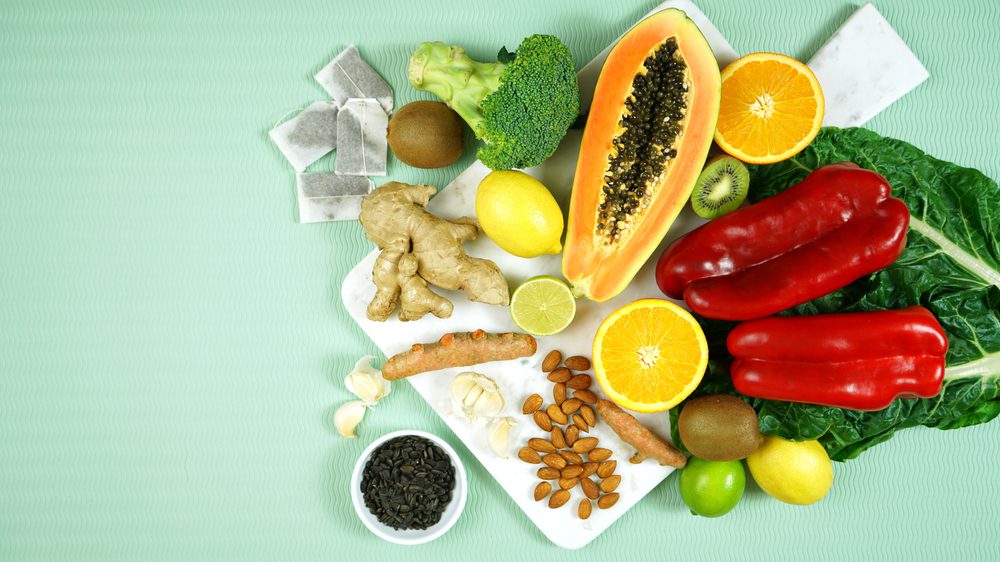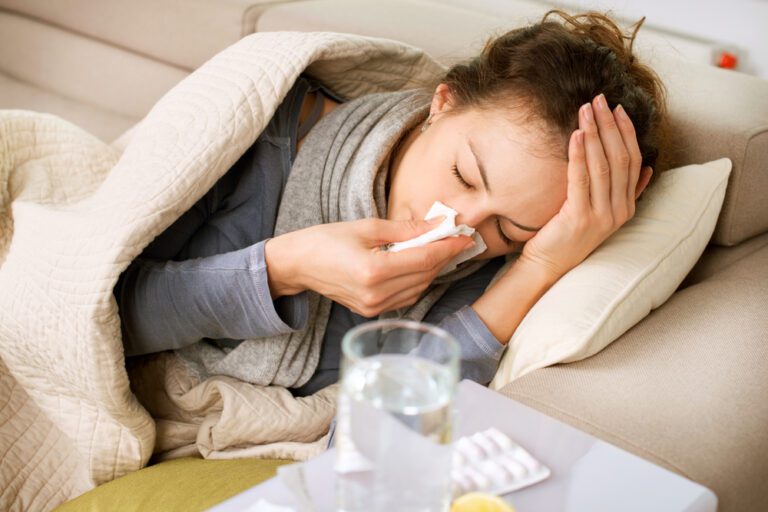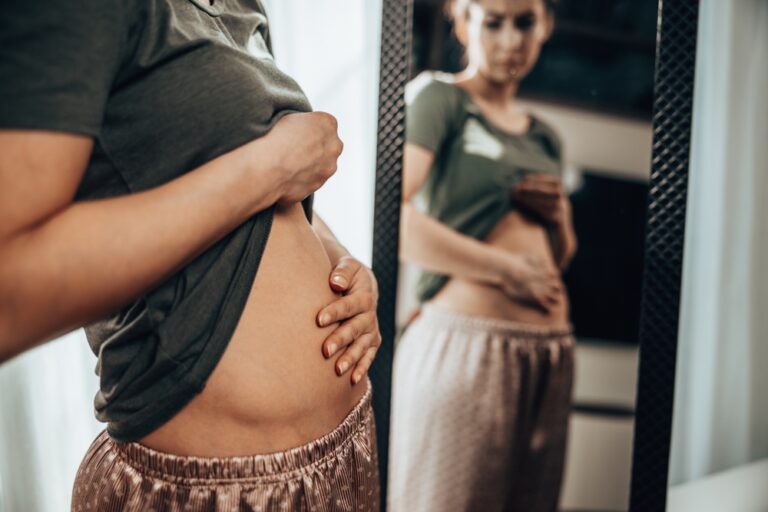When flu season approaches, you should try to get the flu shot, especially when you are over 50. According to estimates from the Centers for Disease Control and Prevention, 36 million Americans contract the common seasonal flu each year. But what can you do before getting the flu shot? Or even after getting the shot?
You can do certain things that can help you with the side effects you might get after the shot, and you can also somehow boost its effectiveness.
Respect these “rules,” and you will be sure you will have the best experience with the vaccination. So, are you ready to find out what to do before getting the flu shot and also right after? Prepare to get some extra antibodies!

1. Eat anti-inflammatory foods
One thing that you can do before getting the flu shot is to improve your diet. Even if there are no miracle foods that can prevent disease, eating foods that are rich in vitamins and nutrients will surely boost your immune system. This means your body will be better prepared in case it has to fight bacteria and viruses.
Leaning toward more anti-inflammatory foods is one of the greatest ways to boost your immune system. In addition to boosting your immunity, this will assist in lowering bodily inflammation both before and after the shot.
An anti-inflammatory diet can also help lower your chance of developing other chronic illnesses over time, such as diabetes and heart disease. In addition to lowering your fatigue levels, anti-inflammatory meals may also lower your chance of headaches.
Some of these foods are lentils, whole grains, beans, fresh fruits and vegetables, and fish.
2. Before getting the flu shot, grab a snack
Before getting the flu shot, you might feel anxious, and this can cause fainting in some people. This is why you should have some water and a snack beforehand.
Eating a little bit can help reduce anxiety, and in this way, it can prevent fainting. Choose something light, like a fruit or some peanuts, and always have a bottle of water with you.
3. Drink 16 ounces of water per day
Always stay hydrated, no matter what. Even if you don’t get vaccinated, you still need to drink water. This can help with many functions of your body, such as regulating temperature. This is why it is important to be hydrated before getting the flu shot.
One of the side effects is fever, and if you drink an appropriate amount of water, you will be able to regulate your body temperature better in case of a fever. Various factors determine how much water you need, but in the days before your vaccination, try to make a conscious effort to drink an additional glass or two of water every day.
Here are some tips that might help you drink more water: Add some citrus or herbs to your water to make it taste better; try to eat more hydrating foods; always keep a nice-looking pitcher around you; and carry a water bottle with you everywhere you go.
4. Have balanced meals
Usually, the flu vaccination season begins in October and November. This means that trying to have a healthier diet is an amazing idea, and you should start earlier. This will give your immune system a real boost with all of the nutrients and vitamins you can get from good meals. It is never too late to start eating healthier.
A simple way to vary your diet and increase the quantity of vitamins, minerals, and antioxidants you eat is to focus on incorporating more color into your plate. By this, we mean that you should try to add as many vegetables and fruits as possible.
Doing this will also help you before getting the flu shot and after getting it. Try to make your immune system strong, and make it a goal to have at least three natural colors on your plate at most of your meals. Also, eating veggies and fruits will hydrate you since they are full of water.
5. Timing is everything
One of the best things you can do before getting the flu shot is do a little bit of planning. Summer turns into fall quickly, and you should get the shot early if you want the maximum amount of protection.
In order for the vaccination to have the most impact, the CDC advises receiving it by the end of October. But why is this so important? Since you get the shot until your body manages to develop the much-needed antibodies, there is a 2-week period.
So, if you get the shot too late, your body might not be ready, and there is a high chance that you will not develop the antibodies before the flu season starts.
6. Eat plain food
This is a tip you need to consider after getting the flu shot. Nausea is one of the side effects of vaccination. It’s true that it is rare, and when it happens, the symptoms are not that bad; usually, they are mild. Nevertheless, it is always better to be prepared.
Maybe you are one of those people who gets affected by the after-shot nausea, and what you can do about this is to be careful with what you eat the day you get the shot. It is not bad to be prepared in case of an upset stomach.
Go to the store and buy some of the good old pantry staples like pasta, rice, and saltine crackers, and don’t forget about bananas and avocados. These foods are plain and simple. Perfect if you feel nauseous or your stomach is upset after getting the shot.
7. Keep having healthy habits
We know that we said it was a good idea to have a healthier lifestyle before getting the shot, but how about after it? What happens next? The best thing you can do is to continue living healthy. In this way, your immune system will always be strong, not just before the vaccination.
The CDC states that after receiving the vaccination, you should be completely recovered from any uncommon or mild adverse effects. But this should not stop you from maintaining a healthy diet or exercising.
8. Remain hydrated
The immune system processes the flu shot and starts to develop protection with the support of a healthy diet and fluid balance. A minor headache is also one of the side effects of a flu vaccine that may occur. Remember that the headache may get worse if you’re dehydrated.
As a general rule, it’s a good idea to drink enough water—and maybe a few additional glasses—the day before, the day of, and the day following your flu vaccination.
Staying hydrated is an important factor, and you should not forget about it. It doesn’t matter if you have already been vaccinated. Always drink your water.

9. Take some prebiotics and probiotics
Maybe you have used something like this before. This type of medicine is good when you are under antibiotic treatment because it helps restore good gut bacteria. But some new studies reveal something truly interesting. Prebiotics and probiotics can make the flu shot more effective.
Even better, you don’t need to take medications in order to get what you need for your microflora. You can get all of these in the form of regular foods that all of us consume on a regular basis.
To increase your intake of beneficial gut bacteria, try eating more fruits, veggies, whole grains, yogurt, kefir, and fermented foods (including kombucha, sauerkraut, and kimchi).
If you want to always be hydrated, no matter what, you might need a water bottle that you can carry with you everywhere you go: Sahara Sailor Water Bottles, 32oz
You should also read: 5 Must-Have Items for This Flu Season, According to Doctors

























